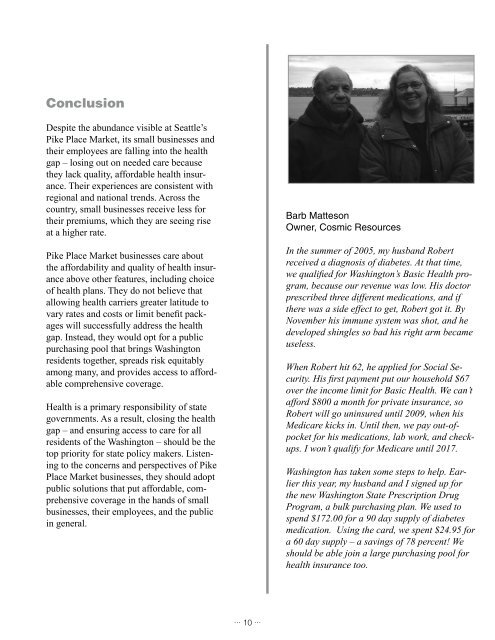Read about these owners' experiences - Alliance for a Just Society
Read about these owners' experiences - Alliance for a Just Society
Read about these owners' experiences - Alliance for a Just Society
Create successful ePaper yourself
Turn your PDF publications into a flip-book with our unique Google optimized e-Paper software.
Conclusion<br />
Despite the abundance visible at Seattle’s<br />
Pike Place Market, its small businesses and<br />
their employees are falling into the health<br />
gap – losing out on needed care because<br />
they lack quality, af<strong>for</strong>dable health insurance.<br />
Their <strong>experiences</strong> are consistent with<br />
regional and national trends. Across the<br />
country, small businesses receive less <strong>for</strong><br />
their premiums, which they are seeing rise<br />
at a higher rate.<br />
Pike Place Market businesses care <strong>about</strong><br />
the af<strong>for</strong>dability and quality of health insurance<br />
above other features, including choice<br />
of health plans. They do not believe that<br />
allowing health carriers greater latitude to<br />
vary rates and costs or limit benefit packages<br />
will successfully address the health<br />
gap. Instead, they would opt <strong>for</strong> a public<br />
purchasing pool that brings Washington<br />
residents together, spreads risk equitably<br />
among many, and provides access to af<strong>for</strong>dable<br />
comprehensive coverage.<br />
Health is a primary responsibility of state<br />
governments. As a result, closing the health<br />
gap – and ensuring access to care <strong>for</strong> all<br />
residents of the Washington – should be the<br />
top priority <strong>for</strong> state policy makers. Listening<br />
to the concerns and perspectives of Pike<br />
Place Market businesses, they should adopt<br />
public solutions that put af<strong>for</strong>dable, comprehensive<br />
coverage in the hands of small<br />
businesses, their employees, and the public<br />
in general.<br />
... 10 ...<br />
Barb Matteson<br />
Owner, Cosmic Resources<br />
In the summer of 2005, my husband Robert<br />
received a diagnosis of diabetes. At that time,<br />
we qualified <strong>for</strong> Washington’s Basic Health program,<br />
because our revenue was low. His doctor<br />
prescribed three different medications, and if<br />
there was a side effect to get, Robert got it. By<br />
November his immune system was shot, and he<br />
developed shingles so bad his right arm became<br />
useless.<br />
When Robert hit 62, he applied <strong>for</strong> Social Security.<br />
His first payment put our household $67<br />
over the income limit <strong>for</strong> Basic Health. We can’t<br />
af<strong>for</strong>d $800 a month <strong>for</strong> private insurance, so<br />
Robert will go uninsured until 2009, when his<br />
Medicare kicks in. Until then, we pay out-ofpocket<br />
<strong>for</strong> his medications, lab work, and checkups.<br />
I won’t qualify <strong>for</strong> Medicare until 2017.<br />
Washington has taken some steps to help. Earlier<br />
this year, my husband and I signed up <strong>for</strong><br />
the new Washington State Prescription Drug<br />
Program, a bulk purchasing plan. We used to<br />
spend $172.00 <strong>for</strong> a 90 day supply of diabetes<br />
medication. Using the card, we spent $24.95 <strong>for</strong><br />
a 60 day supply – a savings of 78 percent! We<br />
should be able join a large purchasing pool <strong>for</strong><br />
health insurance too.




